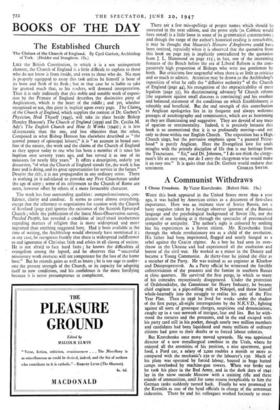BOOKS OF THE DAY .
The Established Church
The Claims of the Church of England. By Cyril Garbett, Archbishop of York. (Hodder and Stoughton. 15s.) LIKE the British Constitution, in which it is a not unimportant element, the Church of England is a little difficult to explain to those who do not know it from inside, and even to those who do. No man is properly equipped to essay this task unless he himself is bone of its bone and flesh of its flesh ; but in that case he is liable to take for granted much that, to his readers, will demand interpretation. Thus it is only indirectly that this noble and notable work of exposi- tion by the Primate of England describes the distinctive piety of Anglicanism, which is the heart of the riddle ; and yet, whether recognised or not, this piety is implicit upon every page. The Claims, of the Church of England, which supplies the context of Dr. Garbett's Physician, Heal Thyself (1945), will take its place beside Bishop Hensley Henson's The. Church of England (1939) and Dr. Cecilia M. Ady's The English Church and How It Works (1940) ; it is less idiosyncratic than the one, and less objective than the other, Composed in what Bishop Henson has elsewhere described as " the normal penury of episcopal leisure," it is " an account in broad out- line of the nature, the work and the claims of the Church of England as they appear today to one who has been a member of it since his baptism over seventy years ago, and has served it as one of its ministers for nearly fifty years." It offers a description, orderly yet discursive, "of what the Church of England standi for, the work it has done and is doing, and its great opportunities for service in the future." Despite the title, it is not propagandist in any ordinary sense. There is nothing in it calculated to provoke any Free Churchman under the age of sixty ; some of its references to the Church of Rome are stern, however offset by others of a more favourable character.
The work has four outstanding qualities ; comprehensiveness, con- fidence, clarity and candour. It seems to cover almost everything, except that the reference to negotiations for reunion with the Church of Scotland (page 250) ignores the existence of the Scottish Episcopal Church ' • while the publication of the latest Mass-Observation survey, Puzzled People, has revealed a condition of intell!ctual incoherence regarding matters of religion that is more widespread --and more ingrained than anything suggested here. Had it been available at the time of writing, the Archbishop would obviously have mentioned it ; in any case, he recognises frankly that there is widespread indifference to and ignorance of Christian faith and ethics in all classes of society. He is not afraid to face hard facts ; he knows the difficulties of evangelism among the lapsed, and he observes that "successful. missionary work overseas will not compensate for the loss of the home base." But he records gains as well as losses ; he is too sage to under- rate the present strength of the Church. or its capacity for adapting itself to new conditions, and his confidence is the more fortifying because it is never presumptuous or complacent. There are a few mis-spellings of proper names which should be corrected in the next edition, and the prose style (as Cobbett would have noted) is a little loose in some of its grammatical constructions ; and though the range of the author's historical reading is remarkable, it may be thought that Maurois's Histoire d'Angleterre could have been omitted, especially when it is observed that the quotation from this book on page 205 is implicitly contradicted by the quotation from J. L. Hammond on page 115 ; in fact, one of the interesting features of the Bench before the era of Liberal Reform is the com- paratively high proportion of Bishops who were not gentlemen by birth. But criticisms fare ungrateful when there is so little to criticise and so much to admire. Attention may be drawn to the Archbishop's exposition of what he calls the " diffusive authority " of the Church of England (page 44), his recognition of the impracticability of mere legalism (page 55), his discriminating advocacy Hof Church reform (the argument against small dioceses is convincing) and his resolute and balanced statement of the conditions on which Establishment is tolerable and beneficial. But the real strength of this contribution to Anglican apologetics lies in its frequent and always welcome passages of autobiography and reminiscence, which are as heartening as they are illuminating and suggestive. They are devoid of any trace of egotism or sentimentality. Indeed, it is precisely because this book is so unemotional that it is so profoundly moving—and not only to those within our English Church. The exposition has a High Church tinge, but the pervasive emphasis upon "a pastoral Priest- hood " is purely Anglican. Here the Evangelical love for souls mingles with the priestly discipline of life that is our heritage from the Tractarians. " Sir," said Dr. Johnson, " I do not think the clergy- man's life an easy one, nor do I envy the clergyman who would make it an easy one." It is quite clear that Dr. Garbett would endorse that


































 Previous page
Previous page